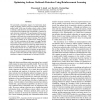Free Online Productivity Tools
i2Speak
i2Symbol
i2OCR
iTex2Img
iWeb2Print
iWeb2Shot
i2Type
iPdf2Split
iPdf2Merge
i2Bopomofo
i2Arabic
i2Style
i2Image
i2PDF
iLatex2Rtf
Sci2ools
102
click to vote
AAAI
2007
2007
Optimizing Anthrax Outbreak Detection Using Reinforcement Learning
The potentially catastrophic impact of a bioterrorist attack makes developing effective detection methods essential for public health. In the case of anthrax attack, a delay of hours in making a right decision can lead to hundreds of lives lost. Current detection methods trade off reliability of alarms for early detection of outbreaks. The performance of these methods can be improved by modern disease-specific modeling techniques which take into account the potential costs and effects of an attack to provide optimal warnings. We study this optimization problem in the reinforcement learning framework. The key contribution of this paper is to apply Partially Observable Markov Decision Processes (POMDPs) on outbreak detection mechanism for improving alarm function in anthrax outbreak detection. Our approach relies on estimating the future benefit of true alarms and the costs of false alarms and using these quantities to identify an optimal decision. We present empirical evidence illust...
AAAI 2007 | Detection Methods | Effective Detection Methods | Intelligent Agents | Outbreak Detection |
Related Content
| Added | 02 Oct 2010 |
| Updated | 02 Oct 2010 |
| Type | Conference |
| Year | 2007 |
| Where | AAAI |
| Authors | Masoumeh T. Izadi, David L. Buckeridge |
Comments (0)

